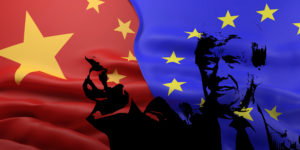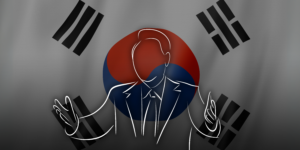Belarus was admitted into the China-led Shanghai Cooperation Organization in July, the same month that a Sino-Belarusian military exercise was held near the border of a NATO member, a signal of China’s growing presence in European security.
Key takeaways:
-
Belarus’ membership in the Shanghai Cooperation Organization (SCO) will facilitate deeper security cooperation with China.
-
Türkiye’s interest in joining the SCO and Serbia’s growing military ties with China signal an expansion of Beijing’s bilateral security relationships in Europe beyond Belarus.
-
EU and NATO opposition ensure that China will be limited to developing ad hoc, bilateral security partnerships with a few European states, rather than making a more expansive push for influence in European security.
On July 8th, the Chinese military arrived in Europe. In a series of exercises near the Belarusian city of Brest, just five kilometers from the Polish border, the People’s Liberation Army and the Armed Forces of Belarus engaged in drills designed to enhance their “coordination capabilities”. Codenamed Eagle Assault, the 11-day operations included joint exercises in reconnaissance, counterterrorism, and hostage rescue. They began as the leaders of most European countries headed to Washington for a summit celebrating the 75th anniversary of the North Atlantic Treaty Organization (NATO).
Eagle Assault occurred just four days after Belarus was admitted into the Shanghai Cooperation Organization (SCO), an economic and security organization founded in 2001 by China, Russia, Uzbekistan, Kyrgyzstan, Tajikistan, and Kazakhstan. The SCO expanded for the first time in 2017 when Pakistan and India joined, and then again in 2023 to include Iran. While the SCO lacks the mutual defense obligations of a formal alliance and is too internally divided to be considered a coherent bloc, it has provided a useful platform for cooperation on security issues. Its members are, to varying degrees, critical of the Western-dominated international order that has prevailed since the end of the Cold War.
Belarus is certainly one of those states. Amid authoritarian leader Alexander Lukashenko’s brutal crackdown on protests following a disputed election in 2020 and Minsk’s indirect participation in Russia’s full-scale invasion of Ukraine two years later, Belarus’ relationship with the West has sharply deteriorated. According to Vladimir Kupriyanyuk, a senior Belarusian military official, the recent military exercises with China were a response to the “West’s aggressive foreign policy towards Belarus”. Under sanctions, Lukashenko has found himself dependent on the Kremlin and, like Russia, needs closer relations with non-Western states. Joining the SCO is likely seen by the Belarusian leadership to fulfill this need.
Expanding Sino-Belarusian security ties?
For Europe, the most significant implication of Belarus’ entry into the SCO concerns its relations with China, the organization’s most influential member. China assumes the role of the chief “intellectual contributor” and the “driving force” of the SCO, using it as a platform to internationalize its domestic security agenda and promote its vision of international affairs. For example, the SCO’s focus on combating terrorist groups and separatist movements reflects the “three evils”—terrorism, separatism, and extremism—that have long featured in China’s domestic security campaigns. (The “three evils” term has even been explicitly referenced in official SCO documents.) The SCO’s policy agenda echoes the New Security Concept, a policy developed by the Chinese government in the late 1990s and early 2000s that names the SCO as a potential implementation method. Official statements by the SCO’s collective membership have also emphasized sovereignty, non-interference, and the importance of economic development for stability, central tenets of China’s international security strategy, as exhibited recently in Beijing’s Global Security Initiative Concept Paper. The SCO’s ability to agree on such joint statements demonstrates the appeal of Beijing’s international security norms to other members when assessing their own national interests.
China’s special status in the SCO has allowed it to mold the security agenda of other members to suit Beijing’s interests. For instance, Beijing has used the SCO’s legal frameworks to compel Kazakhstan to extradite Chinese citizens back to China for prosecution. By promoting a shared security agenda and common perspective on security challenges via the SCO, Beijing has also been able to then develop deeper security ties with other members beyond the official activities of the organization, often bilaterally through joint military exercises and intelligence sharing. This dynamic is evident in China’s relations with Uzbekistan and Tajikistan. In 2019, for example, the national guards of Uzbekistan, Tajikistan, and Kyrgyzstan participated in drills with the People’s Armed Police in northwestern China that enhance their interoperability with Chinese forces. Growing security cooperation with China has been accompanied by increased purchases of Chinese military equipment by Uzbekistan, while Tajikistan became only the second country to host a Chinese overseas military base. (The base is located on Tajikistan’s border with Afghanistan, likely built to address security challenges such as terrorism, a focus of the SCO). While there appears to be no prospect of a Chinese military base in Belarus, the cases of Uzbekistan and Tajikistan demonstrate how Belarus’ entry into the SCO could facilitate an expansion of China’s influence in the country’s security.
Türkiye and Serbia
Beyond Belarus, there are signs that Beijing’s security ties with other regional partners are expanding. Türkiye has been a dialogue partner of the SCO since 2013 and was a participant at the SCO summit in Kazakhstan, where Recep Tayyip Erdoğan, Türkiye’s president, announced his intention to “further develop our relations with Russia and China” and to join the SCO “not just as a dialogue partner but as a member”. If this aspiration is fulfilled, Türkiye would become the third SCO state that borders an EU and NATO member, after Belarus and Russia, and the first to be a member of the SCO and NATO. Erdoğan’s announcement came amid a rapprochement with Beijing after a period that was blighted by tensions over China’s treatment of its Turkic ethnic minorities. Türkiye’s energy minister, Alparslan Bayraktar, visited China in May, and foreign minister Hakan Fidan in June, with several investment and energy cooperation deals agreed upon between the two sides. In July, Erdoğan suggested that China’s President Xi Jinping would visit Türkiye next year, becoming the first Chinese president to do so since Jiang Zemin in 2000.
Türkiye’s admittance to the SCO would mean greater security cooperation with China via the organization’s institutions, such as the Regional Anti-Terrorist Structure, which coordinates joint counterterrorism efforts. Beyond activities directly facilitated by the SCO platform itself, however, the extent to which Turkish SCO membership would lead to more expansive security ties between Türkiye and China would likely depend to a significant degree on relations between Ankara and the West. Under Erdoğan’s leadership, Türkiye has often engaged more actively with its non-Western partners, such as China, during periods when its relations with the West have become frayed. In 2017, amid tensions over the migrant crisis and the attempted anti-Erdoğan coup in 2016—Ankara accused the US of harboring the coup’s supposed instigator, Fethullah Gülen—Türkiye signed a $2.5 billion deal to acquire S-400 missile systems from Russia, causing considerable consternation in the West. SCO membership would open more channels through which Ankara could engage China in the security sphere during moments when Türkiye deems it in its interest to do so. Given the tempestuous history of Erdoğan’s relations with the EU and the US—and tensions are currently high over the West’s support for Israel in its war in Gaza—it should be expected that these new connections would be utilized.
Another potential partner for Beijing is Serbia, which has candidacy status to join the EU. While there is no sign of Serbia joining the SCO, Sino-Serbian security ties have grown considerably closer over the past decade. By 2019, Serbia was importing significant quantities of military equipment from China, such as air-defense systems and drones, and in April 2022 six Chinese military transport planes landed in Serbia carrying Chinese-made FK-3 surface-to-air missiles. Chinese special police units have conducted counterterrorism exercises in Serbia, and the Southeast European country has also purchased advanced street surveillance equipment from Huawei that some fear could be used to clamp down on protests. Sino-Serbian relations reached a new peak in May 2024, when Chinese President Xi Jinping visited Belgrade and, with Serbian President Aleksandar Vučić, celebrated their countries’ “ironclad friendship.” The visit coincided with the 25th anniversary of the American bombing of the Chinese embassy in the city, which occurred during NATO’s air campaign against Serbia in response to ethnic cleansing in Kosovo. Beijing remains deeply skeptical of the US’ claim that the bombing was an accident, with Xi referring to the tragic incident as ‘flagrant’ during his visit.
The conditions appear to be ripe for a further expansion of Chinese influence in Serbia’s security. The continued transfer of Chinese weapons to Serbia will likely be central to this, with both sides viewing this as conducive to their interests. China views arms sales to Serbia as a route into the Southeast European defense market. Serbia will be interested in further imports of Chinese arms as part of its push to augment its military capability, announced by President Vučić earlier this year partly in response to an alleged Kosovan military buildup that threatens ‘regional security and stability’. This political context makes it highly likely that new weaponry will come from a state that backs Belgrade’s claims over Kosovo—with Russia’s defense industry currently overwhelmed by domestic demand, China will play this role. For Serbia, like Türkiye, its periods of closer engagement with non-Western powers are often triggered by tensions with the West, which have risen in the past year over democratic backsliding in Serbia and the West’s support for Kosovan independence. Combined with a shared interest in arms sales, these tensions mean the conditions are ripe for a further expansion of China’s involvement in Serbia’s security.
Conclusion: A growing but limited role
Any expansion of China’s role in European security will be viewed with deep skepticism in most Western capitals. Beijing’s economic support for Russia during its war in Ukraine has hardened European perspectives towards China, with NATO at its recent summit claiming that the country poses ‘systemic challenges to Euro-Atlantic security’. Considering this opposition, any Chinese efforts to develop its security ties with European countries should be regarded as ad hoc attempts by Beijing to expand its influence where it can in Europe rather than the beginnings of a wider push to become a leading actor in the continent’s security.
Chinese security cooperation with countries like Belarus, Serbia, and Türkiye should nonetheless still be regarded as an important issue. Serbia’s ability to forge close military and economic ties with China, combined with Beijing’s backing of Belgrade’s claims on Kosovo, are reducing Serbia’s reliance on the West and thus strengthening its position vis-à-vis its Western partners. Türkiye’s potential accession into the Shanghai Cooperation Organization could have a similar effect in helping Ankara resist Western pressure over areas of disagreement and raising further questions about the internal coherence of NATO. And finally, the survival of the Lukashenko regime, heavily sanctioned and facing popular domestic opposition, could be bolstered by its ability to gain patronage in security affairs beyond its principal ally, Russia. Amidst a growing rivalry between China and the West, Europe should not be considered a region completely free of competition between the two sides.







